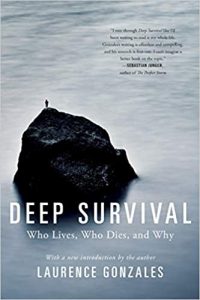
5 Star – Provocative Chance to Reflect
I was given this book by a very educated person who has been attacked over the years for telling the truth about medical fraud including cover-ups of what amounts to electromagnetic genocide and ecocide. He said it saved his life.
Although the book focuses on surviving in the wilderness and in the face of totally unanticipated breakdowns and combinations (e.g. luxury car breaks down a hundred miles from anywhere at same time that a freak storm comes in), it is in many ways a good starting point for reflection about one's inner tool-kit for surviving just about anything.
Early on I am taken by two core points:
Disaster tends to befall those whose mental models are outdated or incomplete and whose mind-sets do not lend themselves to both recognizing that the mental model is off, and rapidly scouting about to update the mental model.
The author spends time on the difference between rational and emotional thinking, why both matter, and how mind-memory is as important as muscle-memory. Self-control and holistic thinking — not obsessing on one point of failure but very rapidly seeing the whole and potential exit points — are discussed.
Rule followers are not survivors. Again: rule followers are not survivors.
I cannot help but relate the above two elements today, where all governments except Sweden have destroyed their economies on the basis of easily detected lies, enabled by a complicit fear-mongering media and wildly stupid people unwilling to question authority.
QUOTE (252): So only if a life is lived in its entirety as an act of survival can you have a hope of finding correct action at the moment of crisis. Survival is a path that must be walked from birth to death. It is a way of life.
QUOTE (273): Survival is a continuous spiritual and phsycial act that spans a lifetime.
The obvious question then is this: are all those people who have chosen a life as a cubicle rat, following orders, never questioning authority, surviving, or are the chattel, sub-human, part of the problem rather than part of the solution?
There are a number of spiritual sections across this book, and it really does offer a vehicle for introspection.
I was struck by a long section on wildlife firefighters who earn very little money, and their recognition of the contradiction between their doing very risky work that saved billions of dollars in prevented loss, and the lack of financial recognition — at the same time, each felt, with total conviction, that they were living a good life, a righteous life, and this was worth vastly more than the salaries paid to Wall Street brokers who cheat people for a living.
The author makes the point over and over again how everything changes once you leave the “sanctuary” of a city with all of its built in safety nets. Away from the buildings and the telephones and the safety services, everything changes can you could be one match, one spark, away from death in a moment.
The author also addresses, over and over, how those who achieve an elementary or even intermediate mastery of hazardous terrain or craft can become so easily over-confident and forgetful. I fall back on offshore sailing, one of my interests, where you can go from cruising along very happily to the sail boat being slapped down by a microburst and water flooding in because the hatch was not closed as a precaution.
The book ends with twelve points to consider as you seek to lead a life in which you are both a survivor and a spirtually sound person — the two are intertwined.
I put the book down with this note:
Authentic, provocative, GIVES PAUSE.



